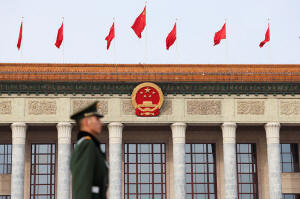China pledges industrial modernization, reiterates past policy goals
 Send a link to a friend
Send a link to a friend
 [July 18, 2024] By
Liangping Gao, Ellen Zhang and Kevin Yao [July 18, 2024] By
Liangping Gao, Ellen Zhang and Kevin Yao
BEIJING (Reuters) -Chinese leaders reiterated on Thursday their
wide-ranging economic policy goals, from modernizing the industrial
complex to expanding domestic demand and curbing debt and property
sector risks, without detailing implementation steps.
The pledges were published in the official news agency Xinhua's readout
of a key meeting of the Communist Party's Central Committee led by
President Xi Jinping, known as a plenum, which takes place roughly every
five years.
The report said Beijing wanted to expand domestic demand, improve social
security, healthcare and income distribution systems and introduce land
reforms - promises which have been made in other official documents in
the past decade.
The release did not say what changes Beijing intends to implement, but
said the "tasks" should be completed by 2029. A document with more
detailed policy plans is expected to be published in coming days.
Analysts said that the plenum outcome pointed to continuity, rather than
any shifts in policymaking or the economic growth model China pursues.
"There is no clear signal of change in macro policies," said Zhang
Zhiwei, chief economist at Pinpoint Asset Management.
Previewed by state media as "epoch-making," the plenum took place at a
time of financial hardship for an increasing number of Chinese at home
and of heightened adversity against the country's industrial policies
abroad.
The world's second-largest economy grew at a slower than expected pace
in the second quarter, leaning hard on industrial output and external
demand, while the crisis-hit property sector and household consumption
continued to disappoint.
China pledged to resolve the deepening imbalance between high investment
and output levels and tepid demand more than a decade ago at a similar
plenum. However, rather than directing resources towards consumers, it
poured money into infrastructure and real estate, accumulating debt at
an unsustainable pace.

[to top of second column] |

A paramilitary police officer stands guard, on the day of the
opening session of the Chinese People's Political Consultative
Conference (CPPCC), in front of the Great Hall of the People, in
Beijing, China March 4, 2024. REUTERS/Tingshu Wang/File Photo

Thursday's communique reiterated China wanted to "actively expand
domestic demand," without giving details.
"There still appears to be a tension between policies aimed at
boosting economic security and expanding the supply-side of the
economy, and those aimed at giving market forces a greater role and
rebalancing growth toward consumption," said Julian Evans-Pritchard,
head of China economics at Capital Economics.
INDUSTRIAL PUSH
The communique re-emphasized China's quest for "new productive
forces", a term coined by Xi last year that envisions scientific
research and technological breakthroughs that could modernize
manufacturing and kickstart a new era of high growth.
"We will improve the institutions and mechanisms for fostering new
quality productive forces in line with local conditions," it said.
The leadership also reiterated its ambitions to reform taxation and
the financial system and said China will "enhance the role of market
mechanisms in the economy, create a fairer and more dynamic market
environment and optimize the efficiency of resource allocation."
The previous wording in official documents was that markets would
"play a decisive role" in the economy.
"Restrictions on the market will be lifted, while effective
regulation will be ensured to better maintain order in the market
and remedy market failures," the report said.
(Additional reporting by Joe Cash and the Beijing newsroom; writing
by Marius Zaharia;Editing by Peter Graff and Susan Fenton)
[© 2024 Thomson Reuters. All rights
reserved.]
This material may not be published,
broadcast, rewritten or redistributed.
Thompson Reuters is solely responsible for this content. |